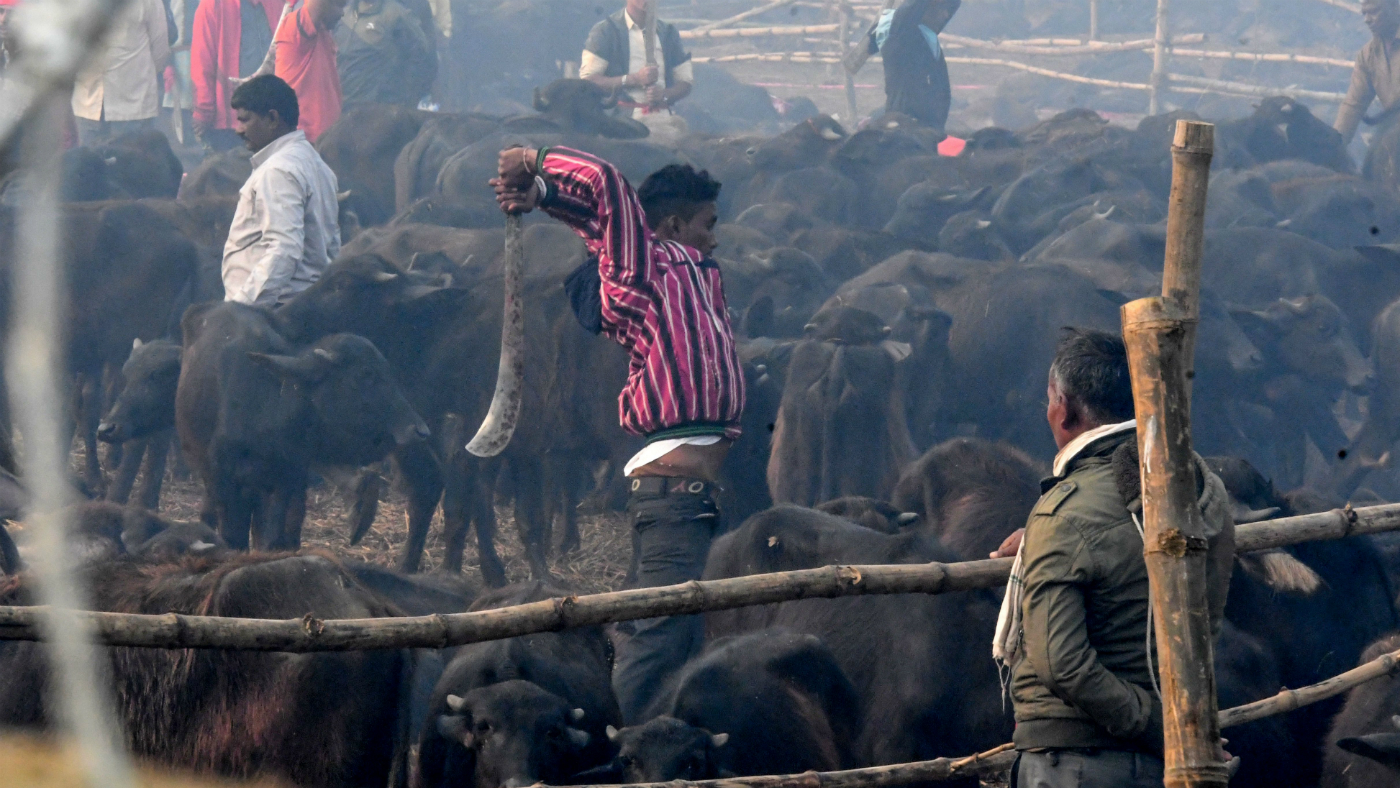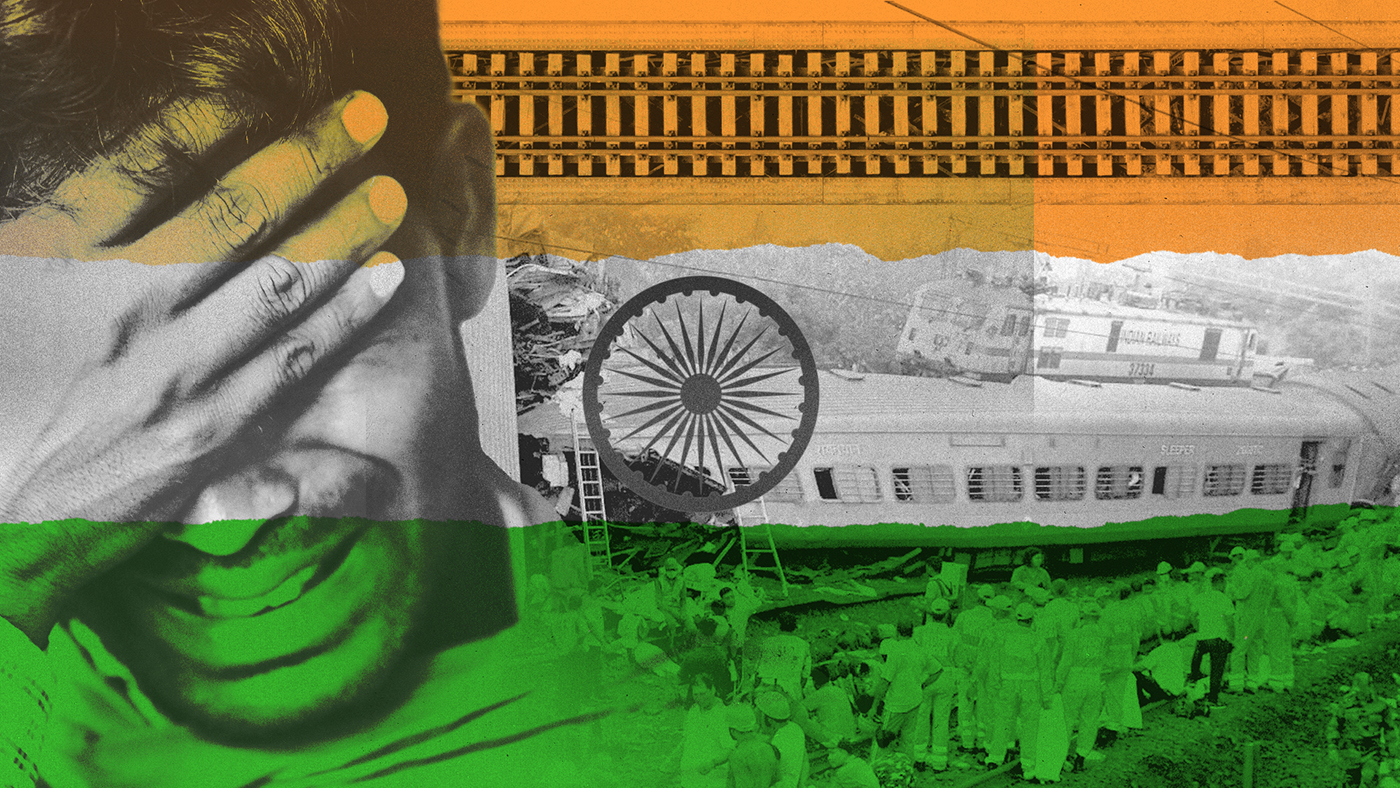What is the Gadhimai festival and why is it so controversial?
The world’s ‘largest animal sacrifice’ is being held in defiance of ban

A free daily email with the biggest news stories of the day – and the best features from TheWeek.com
You are now subscribed
Your newsletter sign-up was successful
Religious worshippers are slaughtering thousands of buffalo and other animals in Nepal this week as part of a highly controversial Hindu festival known as Gadhimai.
The Guardian reports that the two-day festival, held once every five years, began in the early hours of Tuesday in the small Nepalese village of Bariyarpur, close to the Indian border. Tens of thousands of devotees are attending in defiance of a 2015 ban on the animal sacrifices, and despite widespread condemnation both within Nepal and from the wider international community.
Critics say the festival ritual is barbaric, unsanitary and wasteful, but supporters insist it has deep spiritual significance.
The Week
Escape your echo chamber. Get the facts behind the news, plus analysis from multiple perspectives.

Sign up for The Week's Free Newsletters
From our morning news briefing to a weekly Good News Newsletter, get the best of The Week delivered directly to your inbox.
From our morning news briefing to a weekly Good News Newsletter, get the best of The Week delivered directly to your inbox.
The origins of Gadhimai
According to Hindu legend, the tradition dates back around 250 years to when Gadhimai - the Hindu goddess of power - appeared to a prisoner in a dream and asked him to build a temple to her.
After waking to find that the shackles had dropped from his feet, the prisoner went on to construct the Gadhimai temple at Bariyarpur and sacrifice an animal in thanks.
Since then, millions of devotees have travelled to the temple to either sacrifice animals or witness their slaughter in order to have their own wishes fulfilled by the goddess, the BBC reports.
A free daily email with the biggest news stories of the day – and the best features from TheWeek.com
Today, around 70% of the attendees at the festival come from India. Indeed, the event’s huge popularity lies in its “proximity to India, where some states have now banned sacrificial slaughter”, writes Pramada Shah, president of the Animal Welfare Network Nepal, in an article for The Guardian.
Listen to "#152 Assassins, audiobooks and animal sacrifice" on Spreaker.
Why is it so controversial?
The scale of the animal killings at Gadhimai is staggering, with the event described as the world’s bloodiest festival. Up to 500,000 are estimated to have been sacrificed during the 2009 festival, and as many as 200,000 in 2014, despite growing protests from across the globe.
Buffalo, goats, rats, chickens, pigs and pigeons are transported from great distances and herded together to be slaughtered, with witnesses describing animals collapsing from exhaustion, sickness and stress before they are killed.
Alokparna Sengupta, managing director of the Indian division of the Humane Society International (HSI) charity, describes being at the festival as “one of the most depressing and challenging experiences of my life”.
“Buffalo calves look on in bewilderment as their mothers are slaughtered in front of them,” Sengupta said. “The hysteria and apparent jubilation at seeing confused and frightened animals being slaughtered was very disturbing.”
The animals’ suffering is worsened by the killing methods employed. Executioners use curved kukri knives - similar to a machete - to behead the animals, with a number of blows usually required to cut through the necks of larger sacrifices such as buffalo.
Critics also point out that from a religious perspective, the ritual also appears to go against the key Hindu principle of “ahimsa” (non-violence), which usually applies to both humans and animals.
“India was a pioneer in introducing the principle of ahimsa to the entire world,” Swami Agnivesh, president of Hindu reform movement the World Council of Arya Samaj, told reporters during the 2014 festival.
“Rituals like Gadhimai where scores of animals are mercilessly sacrificed only corrode our values of compassion.”
–––––––––––––––––––––––––––––––For a round-up of the most important stories from around the world - and a concise, refreshing and balanced take on the week’s news agenda - try The Week magazine. Start your trial subscription today –––––––––––––––––––––––––––––––
What have authorities done?
In 2015, animal rights activists appeared to have won a victory when temple authorities announced a ban on Gadhimai. The following year, Nepal’s supreme court directed the government to discourage the bloodshed.
But campaigners were dismayed when news emerged that the 2019 festival would go ahead, with temple authorities now disputing that they had issued a ban on the practice. In a recent interview with the Animal People Forum, Gadhimai head priest Manghal Chaudhary even insisted that “there’s nothing like ahimsa in our Hindu tradition”.
India has been more proactive than its neighbouring nation in challenging Gadhimai, with teams from HSI reportedly working with India’s armed police this week to seize animals being brought into Nepal illegally to be sacrificed.
However, the charity says that an estimated 2,000 buffaloes have already been smuggled across the border.
“We take comfort from knowing that many thousands more animals would have died but have been spared this massacre due to the combined efforts of animal groups, multifaith groups and the Indian border force,” said HSI boss Sengupta.
“We helped save hundreds of baby goats, pigeons and buffaloes at the border, and devotees have brought thousands fewer buffaloes than at previous Gadhimai events. We may not have a bloodless Gadhimai this time, but we are determined that one day we will see an end to this gruesome spectacle.”
-
 How to Get to Heaven from Belfast: a ‘highly entertaining ride’
How to Get to Heaven from Belfast: a ‘highly entertaining ride’The Week Recommends Mystery-comedy from the creator of Derry Girls should be ‘your new binge-watch’
-
 The 8 best TV shows of the 1960s
The 8 best TV shows of the 1960sThe standout shows of this decade take viewers from outer space to the Wild West
-
 Microdramas are booming
Microdramas are boomingUnder the radar Scroll to watch a whole movie
-
 Pope aide under fire for 'mystical orgasms' book
Pope aide under fire for 'mystical orgasms' bookTall Tales And other stories from the stranger side of life
-
 Thieves who stole shopping bag in for big disappointment
Thieves who stole shopping bag in for big disappointmentTall Tales And other stories from the stranger side of life
-
 Woman has one in 50 million pregnancy
Woman has one in 50 million pregnancyTall Tales And other stories from the stranger side of life
-
 The spiralling global rice crisis
The spiralling global rice crisisfeature India’s decision to ban exports is starting to have a domino effect around the world
-
 The sinister side to India’s fantasy gaming craze
The sinister side to India’s fantasy gaming crazefeature Fantasy gaming is booming in India, despite the country's ban on gambling
-
 India hoping to be fourth country to reach Moon after Chandrayaan-3 launch
India hoping to be fourth country to reach Moon after Chandrayaan-3 launchSpeed Read Rocket aiming to set its lander Vikram down near Moon’s little-explored south pole
-
 Why does India have so many train crashes?
Why does India have so many train crashes?Today's Big Question The deadly Odisha crash is the latest in a string of rail accidents in the country
-
 More than 260 killed and 900 injured in Indian train crash
More than 260 killed and 900 injured in Indian train crashSpeed Read